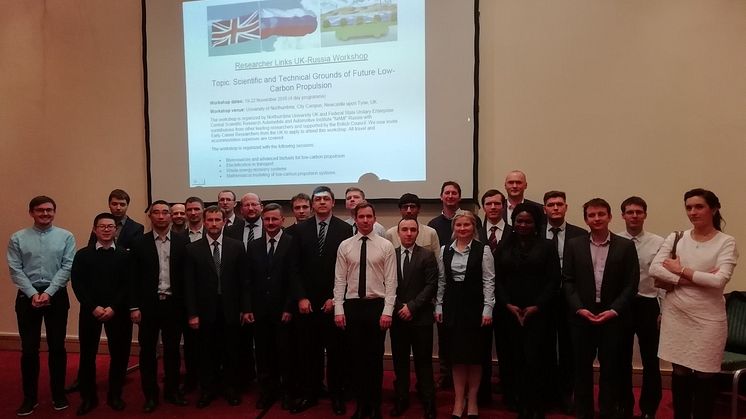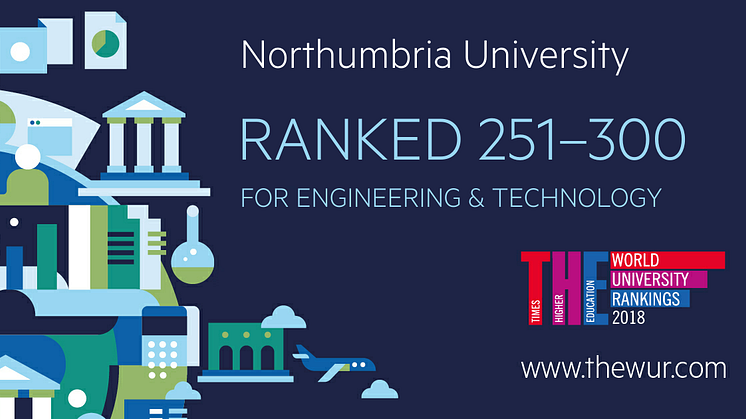
Press release -
Low-carbon travel a step closer following international workshop
New research collaborations have been established between UK and Russian Universities which could see a new generation of low-carbon engines developed – potentially reducing the environmental impact of air and automotive travel in the future.
Northumbria University, in Newcastle upon Tyne, recently hosted a Researcher Links UK-Russia workshop on low-carbon propulsion technologies, supported by the British Council.
The event saw researchers from eight Russian universities and research institutes, including from Moscow, Chelyabinsk, Nizhniy Novgorod and Kazan, join researchers from 14 UK universities to discuss future trends in low-carbon transport.
These included biofuels, electrification, recovering waste energy and the use of mathematical modelling to maximise performance.
The event was organised by Dr Ulugbek Azimov, Programme Leader in Automotive Engineering at Northumbria University. He said: “During the workshop all those attending agreed that electric drives and electric propulsion systems can achieve clean and more sustainable transport, particularly for passenger vehicles. However, the main issue is how that technology can be applied to heavy-duty vehicles and trucks.
“This problem could be resolved by the effective use of bioresources to produce cost-effective advanced biofuels from microalgae, organic waste materials. There also needs to be more research into fuel design and understanding how the molecular structure of fuel can be devised to minimize the exhaust gas emissions.”
The workshop opened with a keynote presentation by Prof Alexey Terenchenko and Prof Andrey Kozlov, both from the Russian Central Scientific Research Automobile and Automotive Engines Institute (NAMI).
Northumbria University: researcher Links workshop on low-carbon propulsion from Northumbria University on Vimeo.
The participants were given insights into the UK automotive and engineering industry, with a presentation by Dr Cedric Rouaud, from Ricardo; and Ghanim Putrus, Professor of Electrical Power Engineering at Northumbria and an expert in transport electrification.
Dr Conor Snowden from the British Council spoke about the importance science and research plays in cultural relations and a keynote presentation was also delivered covering mathematical modelling of low-carbon propulsion systems by Alexey Burluka, Professor of Future Engineering at Northumbria University.
During the event, participants visited the Sir Joseph Swan Centre for Energy Research at Newcastle University, as well as Northumbria University’s Faculty of Engineering and Environment. They were also able to experience the region’s cultural offerings with visits to Durham Cathedral and Newcastle’s museums and galleries.
The event helped to strengthen links between UK and Russia researchers and it is hoped that a further workshop will be held in Russia to discuss autonomous vehicles and future smart cities.
Direct links between the Russian universities and Northumbria University will also now be established, not only in research but in teaching and staff and student exchange.
The workshop discussions focussed on:
- Bioresources and advanced biofuels for low-carbon propulsion - the session discussed the ways of maximizing biofuel-to-energy conversion efficiency, effect of biofuel properties and chemistry on low-carbon propulsion system performance.
- Electrification in transport - the session covered topics on advanced battery technologies, electric machines, power electronics and fuel cells.
- Waste energy recovery systems - the session covered topics on waste energy recovery from combustion of solid waste, waste heat recovery from internal combustion engines, regenerative braking systems and energy storage technologies.
- Mathematical modeling of low-carbon propulsion systems - the session covered topics on mathematical modeling for maximizing the performance and efficiency of low-carbon propulsion systems.
Topics
Categories
Northumbria is a research-rich, business-focused, professional university with a global reputation for academic excellence. To find out more about our courses go to www.northumbria.ac.uk
If you have a media enquiry please contact our Media and Communications team at media.communications@northumbria.ac.uk or call 0191 227 4604.







